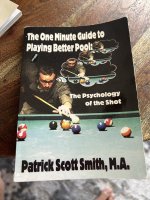I played pool many years before being exposed to the 'Quiet Eye Theory'. While my spending practice time on stroke improvement was worthwhile, I missed an important component of a 'pure stroke'. Stroke follows eye movement. And that component was keeping my eye on the specific target. With my aiming method that target is a specific spot on the object ball.
In missing shots, I found that my eye lost focus on the specific spot causing my stroke move off of the target. Something like an opponent sharking you by moving in front you on your last stroke. Your eye follows the opponent and then your stroke follows your eye movement.
My question is: Do you know exercises to strengthen 'the quiet eye' keeping on target?
In missing shots, I found that my eye lost focus on the specific spot causing my stroke move off of the target. Something like an opponent sharking you by moving in front you on your last stroke. Your eye follows the opponent and then your stroke follows your eye movement.
My question is: Do you know exercises to strengthen 'the quiet eye' keeping on target?

